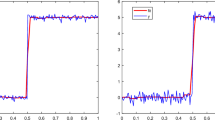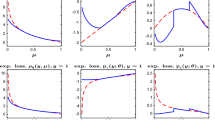Abstract
Our aim in this paper is to estimate with best possible accuracy an unknown multidimensional regression function at a given point where the design density is also unknown. To reach this goal, we will follow the minimax approach: it will be assumed that the regression function belongs to a known anisotropic Hölder space. In contrast to the parameters defining the Hölder space, the density of the observations is assumed to be unknown and will be treated as a nuisance parameter. New minimax rates are exhibited as well as local polynomial estimators which achieve these rates. As these estimators depend on a tuning parameter, the problem of its selection is also discussed.
Similar content being viewed by others
References
N. H. Bingham, C. M. Goldie, and J. L. Teugels, Regular Variation (Cambridge Univ. Press, 1987).
J. Fan and I. Gijbels, Local Polynomial Modelling and Its Applications, in Monographs on Statist. and Appl. Probab. (Chapman and Hall, London, 1996).
S. Gaïffas, “Convergence Rates for Pointwise Curve Estimation with a Degenerate Design”, Math. Methods Statist. 14, 1–27 (2005).
S. Gaïffas, “Uniform Estimation of a Signal Based on Inhomogeneous Data”, Statistica Sinica 19, 427–447 (2009).
S. Gaïffas and G. Lecué, “Aggregation of Penalized Empirical Risk Minimizers in Regression”, (2009) (in press).
A. Goldenshluger and O. V. Lepski, “Universal Pointwise Selection Rule in Multivariate Function Estimation”, Bernoulli 14, 1150–1190 (2008).
E. Guerre, “Design Adaptive Nearest Neighbor Regression Estimation”, J. Multivariate Anal. 75, 219–244 (2000).
P. Hall, J. S. Marron, M. H. Neumann, and D.M. Tetterington, “Curve Estimation when the Design Density is Low”, Ann. Statist. 25, 756–770 (1997).
I. A. Ibragimov and R. Z. Hasminski, Statistical Estimation: Asymptotic Theory (Springer, New York, 1981).
N. Klutchnikoff, Sur l’estimation adaptative de fonctions anisotropes, PhD thesis (Marseille, 2005).
O. V. Lepski, “Asymptotically Minimax Adaptive Estimation I:Upper Bounds, Optimal Adaptive Estimates”, Theor. Probab. Appl. 36, 682–697 (1991).
R. J. Serfling, Approximation Theorems of Mathematical Statistics (Wiley, New York, 1980).
G. R. Shorack and J. A. Wellner, Empirical Processes with Applications to Statistics (Wiley, New York, 1986).
V. G. Spokoiny, “Estimation of a Function with Discontinuities via Local Polynomial Fit with an Adaptive Window Choice”, Ann. Statist. 26, 1356–1378 (1998).
C. J. Stone, “Consistent Nonparametric Regression”, Ann. Statist. 5, 595–645 (1977).
A. B. Tsybakov, Introduction à l’estimation non-paramétrique, in Mathématiques & Applications (Springer, Berlin, 2004), Vol. 41.
Author information
Authors and Affiliations
Corresponding author
About this article
Cite this article
Guillou, A., Klutchnikoff, N. Minimax pointwise estimation of an anisotropic regression function with unknown density of the design. Math. Meth. Stat. 20, 30–57 (2011). https://doi.org/10.3103/S1066530711010030
Received:
Accepted:
Published:
Issue Date:
DOI: https://doi.org/10.3103/S1066530711010030




